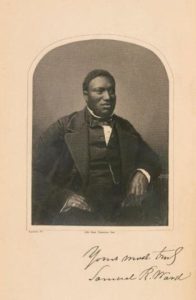
Samuel R. Ward
Rev. Samuel Ringgold Ward was born on this date in 1817. He was a Black abolitionist and minister.
Born a slave on Maryland's Eastern Shore, he escaped with his parents in 1820. His father was descended from an African prince. He learned to read to enjoy the priceless privilege of searching the Scriptures and supporting himself as a house painter. His mother was widowed in a previous marriage and bore three children, all boys; Samuel was the second. Ward grew up in New York and was placed in a public school on Mulberry Street.
In 1833, he became a clerk of Thomas L. Jennings, Esq., one of the most noteworthy of the African American race. “That same year, it pleased God to answer the prayers of my parents in my conversion.” Ward turned to the ministry, where he was advised and recommended by the late Rev. G. Hogarth of Brooklyn.
In 1839, he became an agent of the American Anti-Slavery Society. The same year, the New York Congregational Association licensed him. From 1841 to 1843, he served as pastor of an all-white congregation in South Butler, New York. From 1846 to 1851, his second pastorate was of a white congregation in Courtlandville, New York.
While there, he was the editor of a newspaper devoted to the religious elevation of that denomination. Ward was very talented as an orator and educator of religion. He was nominated as the Liberty party candidate for vice president of the United States for two or three years. For his eloquence, he was styled "the Black Daniel Webster," but in 1850, he criticized Webster sharply for his acquiescence concerning the Fugitive Slave Act. Ward himself became involved in the rescue of a fugitive slave in 1851. Then, fearing arrest, he fled to Canada.
During his two years in Canada, he served as an agent of the Anti-Slavery Society of Canada and assisted the fugitive Black slaves. They had taken residence north of the border. In April 1853, Ward went to England on a fund-raising mission. During his two-year stay, he gave many speeches and published his life story, "Autobiography of a Fugitive Negro" (1855).
In 1855, he settled in Kingston, Jamaica. Until 1860, he served as pastor to a small group of Baptists. He later moved to St. George Parish, where he died in 1866.
An Encyclopedia of African American Christian Heritage
by Marvin Andrew McMickle
Judson Press, Copyright 2002
ISBN 0-817014-02-0